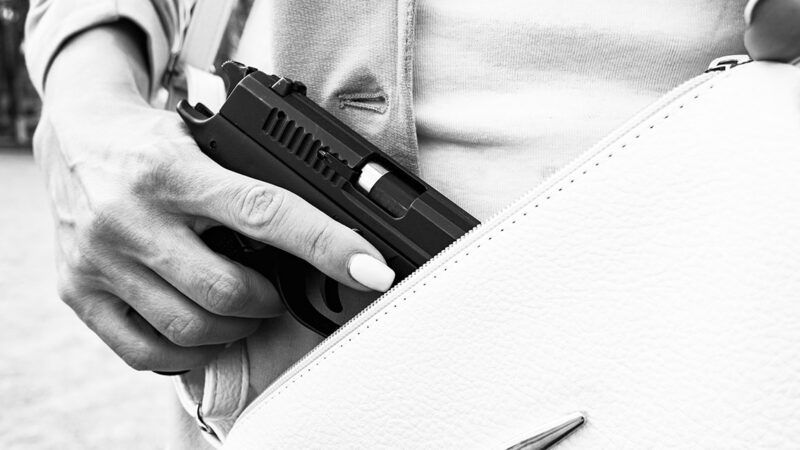The Supreme Court's Ruling in Bruen Was a Big Win for Gun Rights
You don't have to prove to a government official that you have “proper cause” to exercise your constitutional right, the Court ruled.

Gun rights advocates scored a major victory in June when the U.S. Supreme Court ruled 6–3 that "the Second and Fourteenth Amendments protect an individual's right to carry a handgun for self-defense outside the home."
In the 2008 case District of Columbia v. Heller, the Court ruled that the Second Amendment secures the right to possess a handgun inside the home for self-defense. Two years later in McDonald v. Chicago, the justices applied that right against state and local governments under the 14th Amendment, which prohibits states from depriving any person of life, liberty, or property without due process of law. June's decision in New York State Rifle & Pistol Association v. Bruen applied the logic of Heller and McDonald to gun possession in public.
The case involved a New York law requiring that anyone seeking a license to carry a concealed handgun in public satisfy a local official that he has "proper cause" to do so. According to the state, a "generalized" wish to carry a handgun for self-defense was not enough to meet that standard.
"In 43 States," Justice Clarence Thomas noted in the majority opinion, "the government issues licenses to carry based on objective criteria. But in six States, including New York, the government further conditions issuance of a license to carry on a citizen's showing of some additional special need. Because the State of New York issues public-carry licenses only when an applicant demonstrates a special need for self-defense, we conclude that the State's licensing regime violates the Constitution."
The heart of the matter was whether the wide discretion that New York gave local licensing officials was consistent with how constitutional rights are typically treated. "We know of no other constitutional rights that an individual may exercise only after demonstrating to government officers some special need," Thomas wrote. "That is not how the First Amendment works when it comes to unpopular speech or the free exercise of religion. It is not how the Sixth Amendment works when it comes to a defendant's right to confront the witnesses against him. And it is not how the Second Amendment works when it comes to public carry for self-defense."
Justice Brett Kavanaugh, joined by Chief Justice John Roberts, agreed with the majority but wrote separately to emphasize that "the Second Amendment allows a 'variety' of gun regulations." The legal challenges to those various regulations will come knocking at the Court's door soon enough.
This article originally appeared in print under the headline "Gun Rights Win Big at SCOTUS."


Show Comments (125)